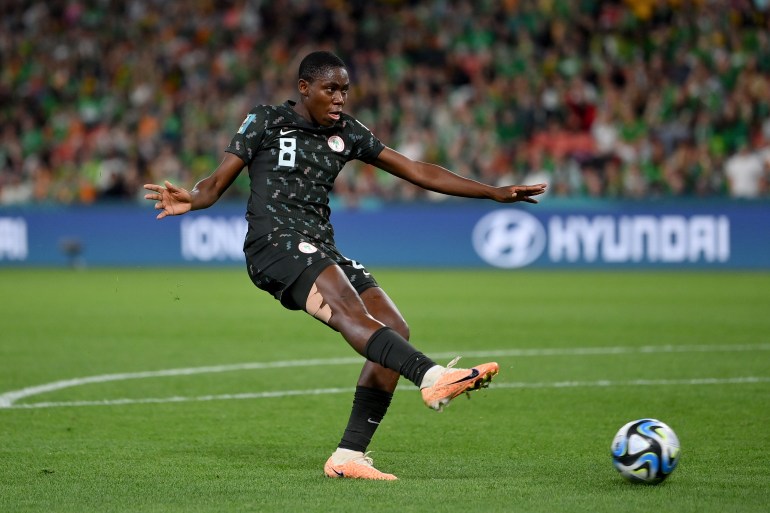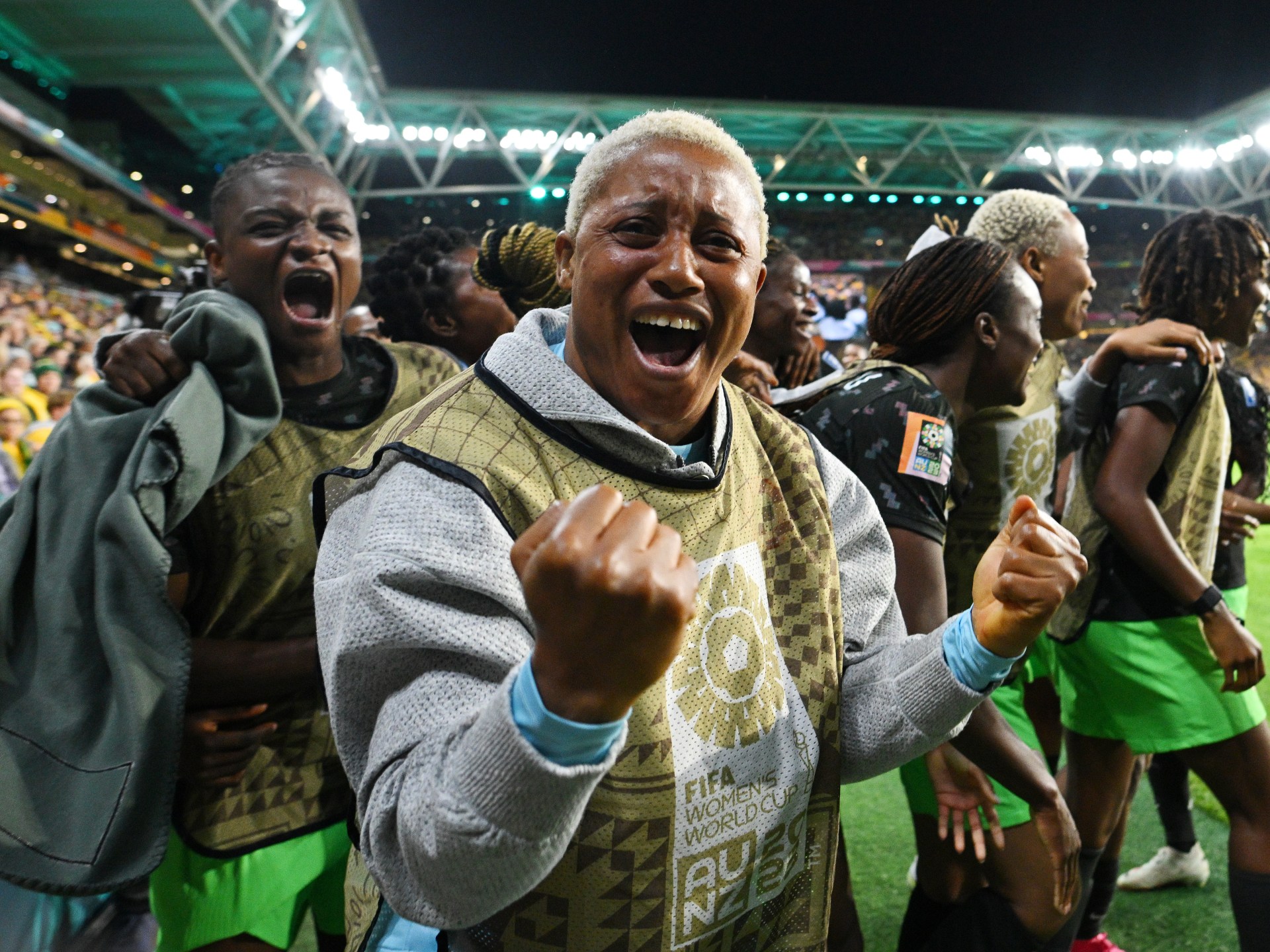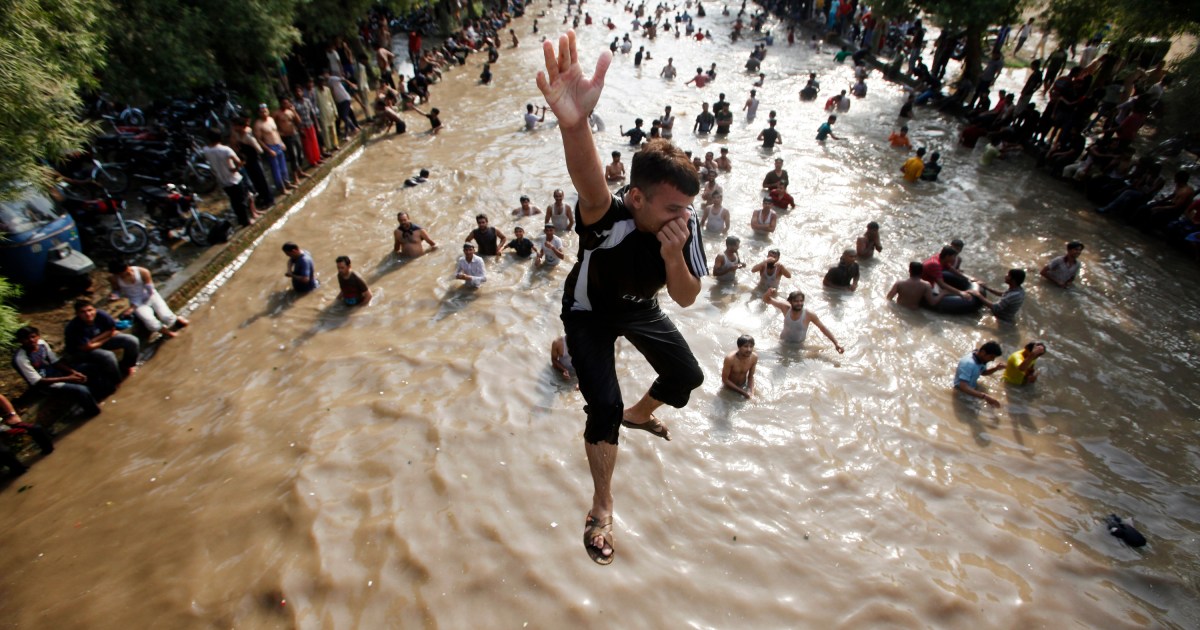‘A breath of fresh air’: Nigeria’s World Cup run sparks joy back home | Women’s World Cup
Lagos, Nigeria – Nigeria’s 0-0 draw with the Republic of Ireland last week took their Women’s World Cup points tally to five from three matches, enough to secure passage from the group stage for only the third time in the country’s history.
A round-of-16 clash with England beckons on Monday, and for 59-year-old cab driver Adetunji Ajagbe, this holds significance. Despite giving up on watching the national teams for years as a means to – in his words – “avoid heart attacks”, the Super Falcons’ performances have tempted him back.
The prospect of one-upping England, in light of the colonial subplot, is particularly tantalising.
“They took so much from us [when] they colonised us,” he says.
He added: “I have not been following Nigeria in [recent] competitions, but these girls are playing good football and using their strength very well. I believe they can go far.”
The work of the current crop in Australia is redemptive in more ways than one.
Not only is it repairing the country’s image as also-rans at the Women’s World Cup and assuaging the anger and disappointment over the Super Eagles’ failure to qualify for the 2022 men’s World Cup in Qatar, but the success of the Super Falcons’ campaign down under has provided a rare bright spot in the midst of political instability and violence, runaway inflation, a cost of living crisis, and growing youth migration.
“Having a national team doing well in a major tournament is always a good distraction for Nigerians as they often forget their crises as long as the team stays in that tournament,” sports journalist Fisayo Dairo told Al Jazeera.
“Some excited fans are already being bullish about the Falcons’ chances of getting to the semifinal, this will further enhance the incredible and unstoppable excitement and support across the country.”
As one of many Nigerians thrilled by the side’s performances, human resources specialist Victoria Olowonefa said it was great to hear positive news about Nigeria on a global stage.
“It’s a breath of fresh air amidst the chaos we are experiencing as a country,” she said.
‘Inspiring’ football
Women’s football has always been popular in Nigeria, but despite the national team featuring at every Women’s World Cup since the 1991 inaugural edition, it has largely played second fiddle to the men’s game – despite the women bringing home much more silverware.
On African soil, Nigeria lead the way with nine titles from 12 Women’s Africa Cup of Nations titles. But at the Women’s World Cup, no nation has lost more matches or conceded more goals.
The Super Falcons were particularly unfancied and beset by disputes on the eve of this World Cup.
Aside from being drawn in a tough group alongside Olympics champions Canada and the co-hosts Australia, Nigeria’s preparations for the 2023 edition were almost derailed by a public war of words between the Nigeria Football Federation (NFF) and the team’s coach Randy Waldrum, as well as the threat of a players’ boycott over a pay dispute.
The American coach bemoaned a lack of support, money owed to both coaches and players and interference in his team selections.
“In October, every country was given $960,000 from FIFA to prepare for the World Cup. Where’s the money?” Waldrum said on the On The Whistle podcast in early July.
His employers in turn fired back, berating him for speaking out of turn – NFF spokesperson Ademola Olajire reportedly branded him an “incompetent loudmouth” and “the worst coach to have handled the Super Falcons by a country mile”.
Despite the national team’s historic record of success in Africa, they have often gotten the short end of the stick relative to their male counterparts. Players have also protested unpaid bonuses at previous tournaments and there has been negligible investment in the local women’s leagues, with seasons regularly truncated due to a lack of funding and clubs understaffed and underfinanced.
It was hardly surprising that many predicted an early exit in this year’s Women’s World Cup and were content to merely avoid disgrace. That Nigeria then went on to secure a place in the round of 16 by beating Australia, holding Canada, keeping two clean sheets and avoiding defeat came as a welcome surprise.
Radio host Biola Solace-Chukwu described the success as “a relief”.
“[It is] a joy to see the team playing inspiring, disciplined football,” he told Al Jazeera.
The team not only boasts attacking stars such as Barcelona’s Asisat Oshoala and Atletico Madrid’s Rasheedat Ajibade, but is also built on a solid defence.
Many credit Waldrum for his ability to block out the noise and get the squad well-drilled and in peak physical condition.
“A lot of people didn’t believe we would get out of the group,” the American coach said. “But now, Nigerians can see the work that we’ve put in, and we’re as prepared as we possibly can [be].”
Meanwhile, some say support for a successful national team has also helped bring a divided nation together.
“This tournament has helped foster national unity as many people look beyond their ethnicity, religious and political affiliations to watch and cheer the women on,” Abuja-based public health worker Opeyemi Afolabi said.
“Watching the women play with so much enthusiasm and success has been a source of inspiration to young people, many of whom look up to some of the players as role models.”

‘No bigger motivation’
Whether the positivity around this World Cup campaign will last long remains to be seen. In many ways, the Super Falcons are papering over the cracks with their results and there is still no resolution over what coaches and players are owed by the NFF.
“The Super Falcons’ success down under has so far been a good distraction from the challenges in the country [but] we all know it’s short-lived because when the game is over, after a few hours or days of celebration, Nigerians are back to reality,” sports journalist Queen John-Moseph said.
However, by raising the profile of women’s football in the country, some hope the World Cup run can improve the levels of accountability and support in Nigerian football.
“This incredible World Cup run will definitely bring the publicity and support the women’s game desperately needs at home,” Afolabi says. “Hopefully, it will also provide players from Nigeria’s local leagues with an opportunity to play in the United States and in some European countries.
“For years, the Super Falcons players have been treated poorly and maybe now they will get the treatment they deserve.”
With reigning European champions England up next, they will need more than enthusiasm and excitement back home if they are to progress to the quarter-finals at a World Cup for only the second time in their history.
That said, while Nigeria would go in as the underdogs, it is a tie that does not hold undue fear for the Super Falcons. They have, after all, nothing to lose and are buoyed by the hope and enthusiasm of more than 200 million people.
In fact, the Super Falcons have a positive head-to-head record against England, having beaten them twice in three meetings.
“The Nigerian team has millions cheering them on at home, on social media, TV and radio,” former Super Falcons goalkeeper Rachael Ayegba, a member of the 2007 World Cup squad, told Al Jazeera.
“And I honestly think there is no motivation bigger than that.”




